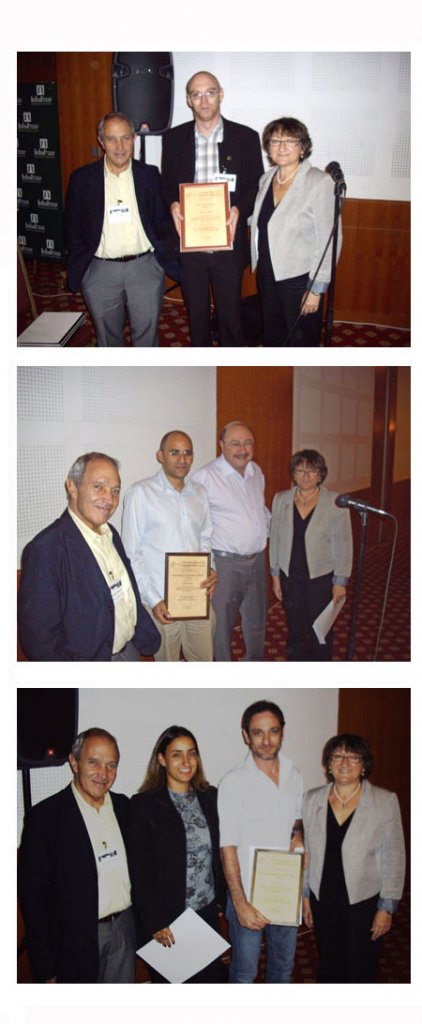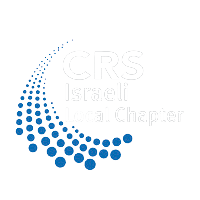PAT 2009
Summary of PAT-2009 Meeting
The Israeli Chapter of the Controlled Release Society was a cosponsor of the PAT 2009 meeting in Jerusalem. Innovations in drug delivery and related topics were presented in three drug delivery sessions and in plenary lectures.
More than 80 members of the Israeli chapter took part in the meeting.
The meeting was opened with a lecture by Nobel Laureate Prof. Israel Aumann, a mathematician who demonstrated the relevance of mathematical basic research on knots to the analysis of interacting polymer chains. Andreas Lendlein described the use of novel, shape memory, biodegradable block copolymers in regenerative medicine and delivery of bioactive compounds, Virgil Percec from the University of Pennsylvania described bioinspired synthesis of dendritic macromolecular systemsf from self-assembling building blocks.
Prof. Dror Deliktar from the Technion discussed the use of methacrylated PEG and natural polymers conjugates for in-situ forming of scaffolds for tissue regeneration and Smadar Cohen from Ben-Gurion University in Beer-Sheva described the development of instructive materials for inducing angiogenesis and tissue regeneration. The drug delivery session was opened with a keynote address by Avri Rubinstein from the Hebrew University of Jerusalem discussing opportunities in colon specific drug delivery, drug absorption opportunities and treatment of inflammatory bowl diseases and colorectal cancer. In addition he described novel methodologies for colorectal cancer diagnosis.
Dan Peer from Tel-Aviv University described the delivery of SiRNA to Leukocytes using hyaluronan-coated nano-vesicles targeted to various receptors on the cell surface. Applications to treatment of inflammatory bowl diseases were detailed. The use of liposomes, derived from cell membranes and conjugated to CCR5, for anti-retroviral therapy, was the topic of the presentation by Tomer Bronstein, from the Technion. Nissim Garti, from the Hebrew University of Jerusalem described his work on double emulsions and their application in neutraceuticals delivery with a focus on stabilization by using complexes of proteins and hydrocolloids.
Emil Rubinov from Ben-Gurion University in Beer-Sheva described the delivery of bioactive HGF to infracted cardiac regions using an injectable biomaterial and the resulting prevention of increased angiogenesis and prevention of apoptosis and infarct expansion.
pictures: from the award ceremony

Yoav Livney talked about the use of arabinogalactan-folate drug conjugates for targeting anti-cancer drugs to folate-receptor-expressing cancer cells. Ronit Satchi-Fainaro described the use of multivalent polymers, for a cancer therapy combining targeting, anti-angiogenic agents and chemotherapy. In-vitro and in-vivo enhanced effects were demonstrated in breast cancer, prostate cancer and bone metastases.
Ravi Kumar described the potential of biodegradable nanoparticles for peroral delivery of poorly soluble drugs and Wahid Khan talked about the characterization and evaluation of paromomycin loaded albumin microparticles in treatment of visceral Leishmaniasis.
Yechezkel Barenholz, one of the inventors of DOXIL™ (doxorubicin in liposomes) an anticancer drug and the first liposomal drug that was approved by the US FDA in 1995, discussed the advantages and limitations of liposomal drugs, and showed how the success and failure as drugs are related to system physicochemical properties.
Neeraj Kumar described the use of brush type amphiphilic copolymers for the formation of polymersomes able to deliver hydrophilic and hydrophobic agents. Gershon Golomb described the use of nanoparticles in modulation of the innate immunity. The session was closed with a presentation by Ayelet David on polymer-peptide drug conjugates for targeting tumor vascular endothelium.
The winners of the 2009 student presentation contest held during the PAT2009 meeting were: First prize: Daniel Zucker, for his presentation: Cancer therapeutic efficacy of two drug combination co-remote loaded into nanoliposomes: relevance of in-vitro synergy, supervised by Prof. Ychezkel Barenholz, Hebrew university of Jerusalem, Second prize: Ehud Segal, RAFT- Synthesized nanoconjugates for targeting bone metastases and calcified neoplasms, supervised by Dr. Ronit Satch-Fainaro, Tel Aviv University, Third prizes: Emil Rubinov Affinity-binding alginate biomaterial for the controlled delivery of cardiovascular-protective factors, supervised by Prof. Smadar Cohen, Ben-Gurion University of the Negev, Beer-Sheva, Eva Kopansky, Polymer conjugates for visualizing solid tumors in the GI tract, and Lior Raviv Mannosylated block copolymer micelles for targeting genes into antigen-presenting cells, both supervised by Ayelet David from Ben-Gurion University of the Negev.
In the conference Gala dinner prizes for student poster presentations were handed to the winners of the competition held in the 6th annual meeting of the Israeli Chapter. Tomer Bronshtein, from the Faculty of Biotechnology Engineering, Technion, Haifa, was awarded the first prize for his presentation CCR5-conjugated proteo-liposomes as a new drug delivery system to HIV reservoir cells and free virion entrapment (supervisor: Prof. Marcelle Machluf), Oded Ovadia from the Hebrew University of Jerusalem won the Second prize for his presentation Permeability and pharmacological activity of backbone cyclic peptides: the effect of N-methylation (supervisor: Prof. Amnon Hoffman), Third prize winners were: Margarita Shumilov (supervisor: Prof. Elka Touitou, Hebrew University of Jerusalem), Ehud Segal (supervisor: Dr. Ronit Satch-Fainaro, Tel Aviv University) and Avi Schroeder (supervisors: Prof. Joseph Kost, Ben Gurion University and prof. Yechezkel Barenholz, Hebrew University of Jerusalem).
Written by: Prof. Rosa Azhari
pictures: from the award ceremony

